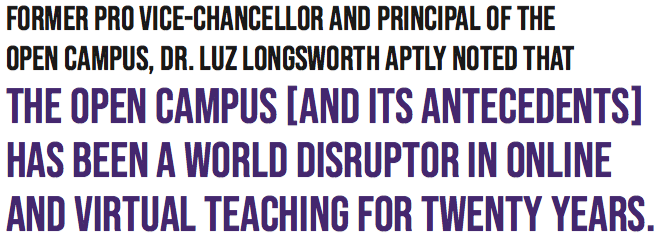
Disruption is about change. It is about challenging the status quo. It behoves innovation. The most obvious and imperative global disruptors over the past decades have been the rapid changes in digital technologies, climate change, social activism, and the most recent in 2020, a pandemic that has shown the world just how inter-connected we are. These imperatives and others, called on us as individuals, as institutions, as nations, as humankind, to be caring, committed and courageous to confront them optimistically, to seek out the value-creating opportunities in them, and to lead in devising and implementing solutions.
The UWI’s approach to these disruptions has been radical rethinking—and being steps ahead of them—in order to remain responsive and relevant to the needs of the stakeholders we serve. The UWI as a global disruptor continues to dare rather than be daunted. This has been our imperative in defining a world of disruption – being proactive rather than reactive.
This in part, answers the question, “Why are we succeeding?”
The UWI has long recognised and celebrated its role as a global disruptor in influencing radical change through innovation. This role was brought sharply into focus with the shaping and implementation of the bold and revolutionary Triple A Strategy - a strategic plan with its finger on the pulse, built upon three performance pillars - Access, Alignment, Agility and dedicated to “revitalising Caribbean development”.
Using the Triple A Strategy framework, The UWI focussed on a Reputation Revolution aimed at demonstrating to our stakeholders and potential partners that The UWI was seized of its role as a global disruptor. In our debut in the global rankings in 2018, our presence and visibility in the international arena served to propel the University into the top 4% of ranked universities in the world. Times Higher Education commented that: “The UWI has done in a few years what other universities have taken decades or centuries.”This was affirmation of the accelerated rate at which this transformation took place. As a global disruptor, we continued to soar in a range of prestigious university rankings as the only Caribbean university ranked among the top for Latin America and the Caribbean, for Golden Age universities (between 50 and 80 years old) worldwide, among the top universities in the Impact Rankings for its response to the world’s biggest concerns aligned to the 17 United Nation’s Sustainable Development Goals, and in the World University Rankings. Then in 2021, in the throes of the pandemic, we earned our highest World University Rankings performance, advancing an impressive 94 places and surging to the top 1.5% in the global field of some 30,000 universities and elite research institutes—a remarkable feat achieved during our five-year strategic cycle.
The UWI is acutely aware of its responsibility of service to the Caribbean and wider world and has declared itself an activist, SDG-engaged university under the Alignment pillar. To address pressing development issues we hinged our strategic plan to all of the 17 UN SDGs. Particular areas of focus have been climate change, social justice and partnerships.

Climate change is a global disrupting force that has been part of The UWI’s research agenda for decades even before it was recognised to be an existential threat. Our researchers and indigenous climate scientists and experts have long advocated for an inter-disciplinary approach to climate change solutions, and have been actively contributing to policy-impacting research at the national, regional and international levels. As an activist university, The UWI has been leading the discourse within the region and globally, to act decisively on the “1.5 to Stay Alive” agenda and resilience strategies. We have partnered with development agencies, donors, universities – individually and in consortia, and governments, to devise and implement solutions to protect lives and livelihoods, and avert the climate crisis.
The UWI champions gender justice and reparatory justice, reflecting the core values of inclusivity and social justice. The University has led in the regional and global reparations movement by pioneering the first-ever Caribbean Reparatory Justice initiative that has given global reparations a sound and workable development framework for wider adoption. These contributions are perfectly aligned with the Black Lives Matter and the Me Too movements that have gained momentum around the world, disrupting thinking and perspectives on social justice.
Today, our world is driven by global connectedness. Under the Agility pillar, we honed in on rebranding our multi-campus regional university as a global university system. We redefined the academy as the “excellent global university rooted in the Caribbean” by embarking on a restructuring and re-engineering to be robustly competitive in the context of 21st century global higher education realities. This redefinition is underpinned by changes in digital technology which is considered to be one of the most disrupting forces. Online pedagogy is transforming before our eyes and the lexicon of learning now includes e-learning, online, hybrid and hy-flex. The UWI had already started on a process of digital transformation before the COVID-19 pandemic unfolded in 2020. It was this focus on Agility that allowed us to pivot with unparalleled nimbleness to respond definitively to the unprecedented demands of the pandemic. After two years, COVID-19 continues to stretch our resilience. The severity of its impact has driven us to reset and revolutionise. The pandemic has sharpened the issue of entrepreneurship and innovation as we seek to take our top-ranked world-class and excellent academic programmes into the global online space to connect with and build a market base of international students.
We are intensifying our efforts on a path to a Revenue Revolution. Among our top priorities in the Triple A Strategy, has been a laser focus on the University’s financial health: reducing dependency on government funding, and moving towards improved budgets for our future sustainability. In 2020, two special sub- committees of the University Grants Committee were established under the leadership of two of our distinguished Prime Ministers. The Prime Minister of Barbados, the Hon. Mia Mottley chaired a committee to examine the systemic deficit drivers on The UWI’s balance sheet and to make recommendations on how to cauterise these drivers. The Prime Minister of Grenada, the Hon. Dr. Keith Mitchell chaired a committee to examine the operations of the University Centre – the Vice-Chancellery – to determine how to better streamline units and resources to maximise efficiency.
We look forward to the reports and recommendations of these committees as they will form an integral part of the next phase of implementation of the strategic plan – the Revenue Revolution. We have embraced a new financial culture and formulated the second phase of our Triple A Strategy - anchored by cost-saving measures, bankable entrepreneurial projects, backing from the grant market and international funders, as well as a business model for our new global online campus.
The UWI has an enduring legacy of provision of essential outreach services to the Caribbean community through its extra-mural department. From the Extra-Mural Department evolved the School of Continuing Studies (SCS), and the further expansion of distance education services through UWIDITE and UWIDEC, to today’s UWI Open Campus. Former Pro Vice-Chancellor and Principal of the Open Campus, Dr. Luz Longsworth aptly noted that the Open Campus [and its antecedents] has been a world disruptor in online and virtual teaching for twenty years. This qualitative growth puts into context the way in which the University has been continuously shaping its capacity and widening its leveraging of modern digital technologies, to improve access by and delivery of higher education services to stakeholders in under- served communities. It was this competence that supported our success in the face of the COVID scourge, to keep moving, providing access to quality education to ALL our students. Our agility in converting over 900+ academic programmes to online, remote formats, ensuring throughput to examination processes and on to graduation for two consecutive years of the pandemic is tribute to the tremendous commitment and dedication of staff – management, academic, administrative and support. I thank them all for ensuring that The UWI survived and succeeded in delivering on its mandate of service to its stakeholders.
During the pandemic we were primarily virtual but never out of touch. Called upon to look after the wellbeing of the people of the region, The UWI remained actively committed to helping contain COVID-19, provided crisis relief and technical support, championed global activism and representation, advocated for investment in higher education and remained SDG-engaged and dedicated to driving Caribbean resilience, all while earning international awards and leaving our mark in global conversations among the biggest players across the world.
These competencies position and propel us onto the next greatest transformation – The UWI’s Global Campus. The Global Campus is a key part of the University’s new finance vision that seeks to convert its global reputation into sustainable revenue.
The past academic year 2020/2021 revealed what The University of the West Indies is made of. As we wrestled with the reality of the pandemic’s impact, we recognised room for improvement, embarked on aggressive and disruptive strategies, and stepped up our mandate to serve the Caribbean. It has been a year that tested us yet again. But we proved our resilience and solid reputation as a top-class, globally-respected academy. A global disruptor navigating a world of disruption. Looking toward the post-COVID world, we are optimistic, and moving ahead with local clarity, and global focus. Our mission continues—The UWI Triple A Strategy of Access, Alignment and Agility alongside a Revenue Revolution all powered by digital transformation. We are succeeding. We are committed.

Professor Sir Hilary Beckles,
Vice-Chancellor,
The University of the West Indies